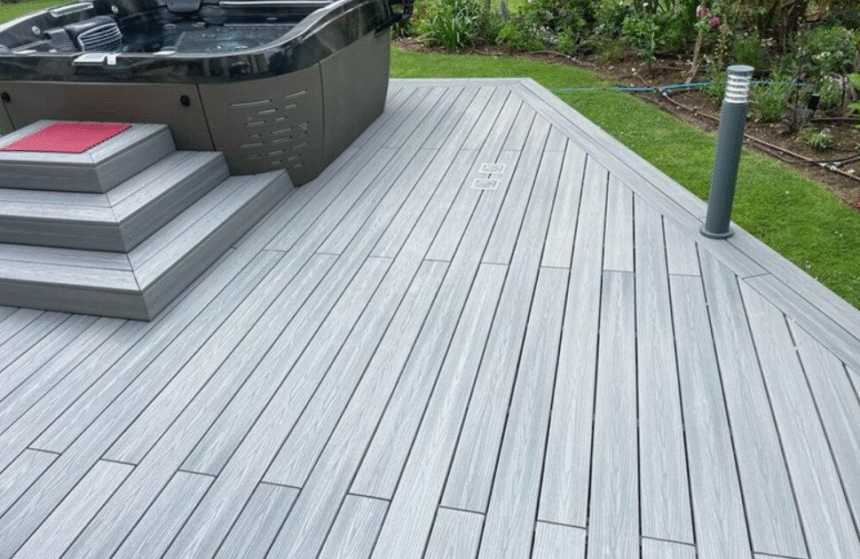Thinking about adding a deck to your backyard? Great choice. A deck can completely transform your outdoor space — a place to kick back, host friends, or just enjoy some fresh air. But here’s the catch: not all decks are created equal. Picking the right material can make a huge difference in how much you enjoy your deck — and how much it costs you over time.
Let’s talk about the two big players in decking: wood and composite. Each has its fans and its drawbacks, and which one fits your lifestyle and wallet depends on a few things. So, let’s break it down together. By the end of this, you’ll know which one might be the right fit for your home.
What’s the Deal with Wood Decking?
Wood decking has been around forever, and for good reason. It’s classic, natural, and has that warm, inviting look that many homeowners love. Popular woods like cedar, redwood, and pressure-treated pine are all solid choices. They each bring a bit of their own style and personality to your outdoor space.
One big plus with wood? The upfront cost tends to be lower than the composite. If you’re on a tighter budget, wood might seem like a no-brainer at first glance. Plus, wood is pretty easy to work with if you want to customize your deck yourself or tweak it later.
But—and here’s the kicker—wood isn’t exactly a “set it and forget it” kind of material. It needs regular maintenance. We’re talking staining, sealing, and sometimes sanding to keep it looking fresh and to protect it from rot, warping, or insect damage. If you’re the type who enjoys a bit of DIY care or doesn’t mind the upkeep, wood might fit right in with your lifestyle. If not, it can quickly become a chore.
Composite Decking: What’s That All About?
Now, if low maintenance sounds like music to your ears, composite decking might catch your eye. Composite is basically a mix of wood fibers and plastic. It’s engineered to give you the look of wood without a lot of the hassle.
With composite, you’re looking at a product that resists rot, insects, and doesn’t warp or crack the way wood can. It holds up well in all kinds of weather. Plus, it usually comes with a manufacturer’s warranty—something you don’t often get with wood.
But keep in mind that peace of mind comes at a price. Composite decking costs more upfront than wood. Also, while it’s tough, it’s not completely immune to scratches or fading over time, especially if it’s in direct sunlight a lot.
Composite decks are perfect for folks who want to spend more time enjoying their deck and less time maintaining it. If your schedule’s already packed or you just don’t want to mess with staining every year, this could be the right call.
Which One Matches Your Lifestyle?
Before you pick your decking material, think about how you’ll actually use your deck. Are you someone who enjoys weekend DIY projects? Do you love the smell of fresh wood and don’t mind the work it takes to keep it looking good? Wood might feel more “at home” for you.
On the other hand, if your weekends are for relaxing and you’d rather not spend hours maintaining your deck, composite offers convenience. It’s also great if you have kids or pets, since it holds up well against wear and tear.
And if you love hosting barbecues or backyard parties but want a deck that looks great without a lot of fuss, composite might make your life easier. Wood can be beautiful, but it demands more attention to keep it party-ready.
Let’s Talk Money: What’s the Budget Look Like?
Price is usually a big factor. Wood decks generally cost less to build initially. You can find quality lumber at reasonable prices, and if you’re handy, you might save on installation costs by doing some work yourself.
But that’s only half the story. Over time, wood decks need regular maintenance — stain, seal, fix boards that warp or splinter. Those costs add up. If you don’t keep up with it, your deck can deteriorate faster, leading to repairs or even early replacement.
Composite decking is more expensive right out of the gate. However, because it requires little upkeep, you save money on staining, sealing, and repairs down the road. For many, the trade-off is worth it. Think of it like buying a reliable car—you pay more upfront but save on maintenance later.
So, when you weigh your options, don’t just look at the initial price tag. Consider what you’ll spend in time, money, and effort over the years. That’s the real cost of your deck.
How a Backyard Deck Contractor Can Make Your Life Easier
Choosing the right material isn’t always straightforward. That’s where a backyard deck contractor comes in handy. These pros know the ins and outs of both wood and composite options and can help match the material to your home, style, and budget.
A good contractor will assess your space, listen to your lifestyle needs, and offer honest advice on what’s realistic. Plus, having a pro handle the installation means your deck will be built right—safer, stronger, and often faster than DIY.
If you’re unsure about where to start or feel overwhelmed by the choices, reaching out to a backyard deck contractor could save you time, money, and headaches. They can walk you through the pros and cons, offer design ideas, and make sure your deck is something you’ll love for years.
So, Wood or Composite? What’s the Bottom Line?
If you’re looking for charm, natural beauty, and a lower upfront cost — and you don’t mind rolling up your sleeves every so often — wood decking might be your go-to.
But if you want something low maintenance, durable, and ready to handle busy family life without a lot of upkeep, composite decking could be the better fit.
Ask yourself: How much time do you want to spend on upkeep? What’s your budget—not just today, but over the next 10 or 15 years? What kind of look and feel do you want from your deck? Answering these will steer you toward the right choice.
Wrapping It Up
Building a deck is a big deal. It’s about creating a space where you can relax, entertain, and make memories. The right decking material will make all the difference between a deck you love and one that’s a headache.
Wood and composite each have clear strengths and some trade-offs. Think about your lifestyle, your budget, and how much time you want to spend on maintenance. That’s how you’ll find the material that fits you best.













